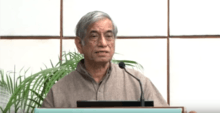Anupam Mishra
Anupam Mishra (Hindi: अनुपम मिश्र; 1948 – 19 December 2016) was an Indian Gandhian, author, journalist, environmentalist, TED speaker, and water conservationist who worked on promoting water conservation, water management and traditional rainwater harvesting techniques.[1] He had been awarded the 1996 Indira Gandhi Paryavaran Puraskar (IGPP) award instituted by the Ministry of Environment and Forests, Government of India.[2] He travelled to villages across several Indian states, especially Rajasthan, Madhya Pradesh, Maharashtra, and Uttar Pradesh, describing the value of time-tested systems of water harvesting. He advocated conservation of traditional water structures in India as well as abroad.[3][4] He wrote books like Aaj Bhi Khare Hain Talaab (Ponds Are Still Relevant, 1993) and Rajasthan Ki Rajat Boondein (Radiant Raindrops of Rajasthan, 1995), landmark works in the field of water conservation.[5][6][7] An extensive interview with Mishra about the history and future of the Yamuna River occupies the last chapter of Rana Dasgupta's book Capital: The Eruption of Delhi.
Anupam Mishra | |
|---|---|
 | |
| Born | 1948 Maharashtra, India |
| Died | (aged 68) New Delhi |
| Occupation | environmentalist |
| Known for | water conservation, rainwater harvesting |
Biography
Mishra was born in Wardha, Maharashtra state, India in 1948. He worked at the Gandhi Peace Foundation in New Delhi in varying capacities since completing his college education in 1969. He promoted the use of indigenous or traditional knowledge to solve water problem via preservation, maintenance and regeneration of ponds, water management and rain water harvesting.[7]
Working with Chandi Prasad Bhatt, he was one of the early chroniclers of the Chipko movement that flourished through the 1970s in Uttarakhand, and published Chipko movement: Uttarakhand women's bid to save forest wealth in 1978.[8]
In 1993, he published Aaj Bhi Khare Hain Talaab (Ponds Are Still Relevant), written after eight years of field research on traditional pond and water management. Soon, it became a handbook for many non-governmental organizations (NGOs) working on water-harvesting projects. Subsequently, it was translated into 19 languages, including Braille, and sold over 100,000 copies, out of which the National Book Trust published 13 languages, including English. His next book, Rajasthan Ki Rajat Boondein (The Radiant Raindrops of Rajasthan), also documented water harvesting and water management in Western Rajasthan. All his books are copyright free.[5][7]
Mishra was awarded the 'Amar Shaheed Chandrasekhar Azad National Award' of 2007–08, instituted by the Government of Madhya Pradesh, Culture Department to "propagate and publicise ideals of freedom struggle, patriotism and social service".[3]
He spoke on the topic "The ancient ingenuity of water harvesting"[9] in 2009 TED conference.
He is the recipient of Jamnalal Bajaj Award for the year 2011.[10][11]
He was editor of the bi-monthly Gandhi Marg, published by the Gandhi Peace Foundation.[12]
Mishra was a true Gandhian in philosophy and practice. Known to be warm and engaging in his demeanor and maintaining his principles throughout his life, he was a role model to many. He passed away on 20 December 2016 after a 10-month battle with cancer.[13]
Works
- Aaj Bhi Khare Hain Talaab (in Hindi), (English title: Ponds Are Still Relevant), published by Gandhi Shanti Pratishthan, New Delhi On line text, 1993.
- Radiant Raindrops of Rajasthan, translated by Ms. Maya Jani, Research Foundation for Science Technology and Ecology, 1995 On line text.
- Chipko movement: Uttarakhand women's bid to save forest wealth, with Satyendra Tripathi. People's Action, 1978.
- Safa Mathe Ka Samaja , Penguin India (3 October 2006)
References
- Rural Jal Yodhas:Anupam Mishra rainwaterharvesting.org.
- List of Indira Gandhi Paryavaran Purashkar Awardees Archived 25 September 2010 at the Wayback Machine Indira Gandhi Paryavaran Puraskar, Official website.
- "Anupam Mishra to be bestowed with Chandrasekhar award". Outlook. 20 September 2008. Archived from the original on 31 January 2013.
- "Are you a water evangelist?". Mint. 6 November 2008.
- "Gandhi Peace Foundation: Rajasthan Ki Rajat Boondein by Anupam Mishra". India Water Portal. Archived from the original on 28 June 2012.
- "Water conservation projects a big success". The Times of India. 23 March 2010.
- "Little drops of water". The Telegraph (Kolkata). 7 November 2004.
- Ramachandra Guha (2001). An anthropologist among the Marxists and other essays. Orient Blackswan. p. 33. ISBN 81-7824-003-3.
- "TED Talk – Anupam Mishra: The ancient ingenuity of water harvesting". TED Conferences.
- "Jamnalal Bajaj Awards Archive". Jamnalal Bajaj Foundation.
- "The water warrior". The Tribune. Chandigarh, India. 13 November 2011.
- "Gandhi Marg: Hindi bi-monthly". Gandhi Peace Foundation, Delhi. Archived from the original on 29 March 2016. Retrieved 28 February 2016.
- "Eco-activist Anupam Mishra passes away". Times of India.
External links
- Anupam Mishra at TED

- gandhipeacefoundation at Kerala
- Select writings and speeches at मनसंपर््क
- A few articles relating Anupam Mishra at Pani Post